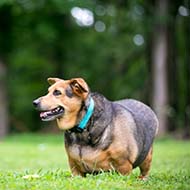
Veterinary charity PDSA has launched a new campaign in a bid to tackle the growing ‘pet obesity crisis’.
Entitled “Weigh Up”, the campaign aims to help dog and cat owners identify the signs of weight gain in their pets and take practical steps to address it.
It comes after the charity’s 2021 ‘Paw Report’ found that 1.4 million of the nation’s pets have gained weight during COVID-19 - and the love that many owners feel for their animals could be a significant part of the problem.
Of the owners who said their pet was overweight, the most common factors preventing them from shedding the pounds were:
- giving in when their pet begs for food (29 per cent)
- they like feeding treats to their pet (19 per cent),
- their pet is fussy with food (19 per cent)
- they feel giving treats shows how much they love them (15 per cent).
PDSA’s study of more than 4,500 pet owners also found that many owners have been feeding their four-legged friends more human treats since the start of the coronavirus pandemic.
Perhaps even more concerning is that dogs are being walked less frequently too, with 38 per cent leaving the house just once a day (370,000 dogs) in 2021, compared to 33 per cent before the pandemic.
The charity says its findings reveal the true extent of an already growing pet obesity epidemic - with the pandemic creating a "ticking time bomb" threatening the lives of pets across the UK.
“Worryingly, the detrimental health effects of obesity in our four-legged family members don’t appear to be well-recognised amongst owners,” commented PDSA vet nurse Nina Downing. “Obesity has been a huge problem among UK pets for a number of years, and sadly our PAW Report indicates this is only getting worse.”
Through the PDSA's new campaign, pet owners can access free online videos and downloadable guides to help get their pets in shape. After identifying their pet’s current size on the campaign website, owners can discover tips and tricks to get their animals back on track.
“The good news is that even if your pooch or kitty is in need of a health kick, it’s never too late to help them eat well, exercise and play more, and live longer,” Nina continued. “In most cases, simply adapting their diet, replacing treats with playtime and encouraging them to move more can make a huge difference, and are all the ingredients needed for our pets to maintain a healthy weight, essential for a happy, healthy life.”



 The latest
The latest